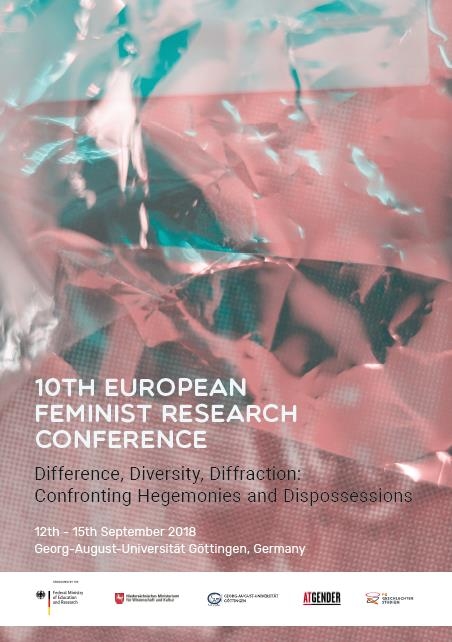Constructing Solidarity Across Difference in Feminist Encounters
DOI:
https://doi.org/10.17169/ogj.2020.72Keywords:
Solidarity, Postcolonial Theory, Feminism, Social Movements, PeruAbstract
In this article, I discuss how solidarity across difference can be fostered in meetings between social movements. Based on the writings of postcolonial feminists and an analysis of two social-movement encounters that took place in Peru, I develop three aspects of solidarity across difference: the recognition of the intersectionality of struggles, the acknowledgment of “unmapped common ground” as a shared basis for working together, and imagination as a mode for bridging the gap between oneself and the Other. I illustrate my argument with examples from the 5th Diálogos – a meeting between urban feminist, women’s, and anti-mining movements, scholar activists and artists – and the 13th Latin American and Caribbean Feminist Encuentro to show how the discursive construction of difference interwove with organizational decisions and the hegemonic ordering of difference to open or constrict the spaces in which solidarity across difference could be developed.
References
13 EFLAC (2014a): Declaración LGBTI XIII EFLAC. Lima: 13 EFLAC.
13 EFLAC (2014b): Manifiesto Político. Por la Liberación de Nuestros Cuerpos. Lima: 13 Encuentro Feminista de América Latina y el Caribe.
13 EFLAC (2014c): Sistematización del 13 Encuentro Feminista Latinoamericano y del Caribe. Por la Liberación de Nuestros Cuerpos. Unpublished Report. Lima: Movimiento Manuela Ramos y Grupo Impulsor Nacional 13eflac.
Alvarez, Sonia E. (2000): Translating the Global. Effects of Transnational Organizing on Local Feminist Discourses and Practices in Latin America. In: Cadernos de Pesquisa 22 1–27.
Anzaldúa, Gloria (1987): Borderlands/La Frontera. The New Mestiza. San Francisco: Aunt Lute.
Anzaldúa, Gloria E. (2002): now let us shift . . . the path of conocimiento . . . inner work, public acts. In: Anzaldúa, Gloria E./Keating, Analouise (Ed.): this bridge we call home. Radical visions for transformation. New York: Routledge, 540–578.
Anzaldúa, Gloria E. (2009): (Un)natural Bridges, (Un)safe Spaces. In: Keating, Analouise (Ed.): The Gloria Anzaldúa Reader. Durham and London: Duke University Press, 243–248. doi: 10.1215/9780822391272-035.
Aparicio, Juan Ricardo/Blaser, Mario (2008): The “Lettered City” and the Insurrection of Subjugated Knowledges in Latin America. In: Anthropological Quarterly 81 (1), 59–94. doi: 10.1353/anq.2008.0000.
Birla, Rita (2010): Postcolonial Studies. Now That’s History. In: Morris, Rosalind C. (Ed.): Can the Subaltern Speak? Reflections on the History of an Idea. New York: Columbia University Press, 87–99.
Carty, Linda E./Mohanty, Chandra Talpade (2015): Mapping Transnational Feminist Engagements. Neoliberalism and the Politics of Solidarity. In: Baksh, Rawwida/Harcourt, Wendy (Ed.): The Oxford Handbook of Transnational Feminist Movements. Oxford: Oxford University Press, 82–116. doi: 10.1093/oxfordhb/9780199943494.013.010.
Clarke, Adele (2005): Situational Analysis. Grounded Theory after the Postmodern Turn. London and New Delhi: Sage Publications. Clarke, Adele/Friese, Carrie/Washburn, Rachel (Ed.) (2015): Situational Analysis in Practice. Mapping Research With Grounded Theory. Walnut Creek: Left Coast Press. doi: 10.4324/9781315420134.
Daza, Mar/Hoetmer, Raphael/Foroni, Nicola/Vargas, Virginia/Contreras, Luna (2016): Diálogos de Saberes y Movimientos en el Perú. Apuntes Sobre Una Experiencia Parecida al Tejer. In: Hegoa/Joxemi Zumalabe/Gipuzkoako Foru Aldundia (Ed.): Experiencias de Formación Política en los Movimientos Sociales. Bilbao: HEGOA – Universidad del Páis Vasco, 69–128.
Diaz-Bone, Rainer (2006): Zur Methodologisierung der Foucaultschen Diskursanalyse. In: Historical Social Research 31 (2), 243–274.
Dinerstein, Ana Cecilia (2015): The Politics of Autonomy in Latin America. The Art of Organising Hope. Houndsmills: Palgrave Macmillan. doi: 10.1057/9781137316011.
Eschle, Catherine (2004): Constructing ‘the Anti-Globalisation Movement’. In: International Journal of Peace Studies 9 (1), 62–84.
Grewal, Inderpal/Kaplan, Caren (Ed.) (1994): Scattered Hegemonies. Postmodernity and Transnational Feminist Practices. Minneapolis and London: University of Minnesota Press.
Greene, Shane (2006): Getting Over the Andes: The Geo-Eco-Politics of Indigenous Movements in Peru’s Twenty-First Century Inca Empire. In: Journal of Latin American Studies 38 (2), 327–254. doi: 10.1017/S0022216X06000733.
Issa, Daniela (2007): Praxis of Empowerment. Mística and Mobilization in Brazil’s Landless Rural Workers’ Movement. In: Latin American Perspectives 34 (2), 124–138. doi: 10.1177/0094582X06298745.
Keating, AnaLouise (2005): Shifting Perspectives. Spiritual Activism, Social Transformation, and the Politics of Spirit. In: Keating, Analouise (Ed.): EntreMundos/AmongWorlds. New Perspectives on Gloria E. Anzaldúa. Houndsmills: Palgrave Macmillan, 241–254. doi: 10.1057/9781403977137_24.
Laclau, Ernesto/Mouffe, Chantal (1985): Hegemony and Socialist Strategy. Towards a Radical Democratic Politics. London: Verso. Las Amazonas por Amazonas. (2017): Las Amazonas por Amazonas. https://www.facebook.com/lasamazonas.poramazonas?lst=813013631%3A 100007953582209%3A1489682357 (15/03/2017).
Leinius, Johanna (2020): Die Translokalisierung lateinamerikanischer Feminismen im Spiegel transnationaler Begegnungen. In: Feministische Studien 38 (1), 57–74. doi: 10.1515/fs-2020-0004.
Leinius, Johanna (forthcoming): The Postcolonial Feminist Ethics and Politics of Research Collaborations across North-South-Divides. In: Ziai, Aram/ Müller, Franziska/Bendix, Daniel (Ed.): Beyond the Master’s Tools. Decolonizing Knowledge Orders, Research Methodology, and Teaching. London: Palgrave. doi: 10.1515/fjsb-2017-0081.
Leinius, Johanna/Vey, Judith/Hagemann, Ingmar (2017): Poststrukturalistische Perspektiven auf soziale Bewegungen. Plädoyer für eine notwendige Blickverschiebung. In: Forschungsjournal Soziale Bewegungen 30 (4), 6–20.
Lorde, Audre (1982): Zami. A New Spelling of My Name. New York: Perspephone Press.
Lorde, Audre (1984): Sister Outsider. Essays and Speeches. Freedom: Crossing Press.
Marttila, Tomas (2015): Post-Foundational Discourse Analysis. A Suggestion for a Research Program. In: FQS. Forum Qualitative Social Research 16 (3).
Mohanty, Chandra Talpade (2003): Feminism Without Borders. Decolonizing Theory, Practicing Solidarity. Durham: Duke University Press. doi: 10.1215/9780822384649.
Morgan, Robin (1984): Sisterhood is Global. The International Women’s Movement Anthology. New York: The Feminist Press at CUNY.
PDTG (2010): Entre la Crisis y Otros Mundos Posibles. Memoria del I Taller de Diálogos de Movimientos y Saberes. Lima: PDTG.
PDTG (2014): Memoria V Diálogos de Saberes y Movimientos. Lima: PDTG.
Rama, Angel (1996): The Lettered City. Durham: Duke University Press.
Risler, Julia/Ares, Pablo (2014): Talleres de mapeo. Recursos lúdicos y visuales para la construcción de conocimiento colectivo. In: Ecología Política 76–82.
Roshanravan, Shireen (2014): Motivating Coalition. Women of Color and Epistemic Disobedience. In: Hypatia 29 (1), 41–58. doi: 10.1111/hypa.12057.
Safa, Helen I. (2005): Challenging Mestizaje: A Gender Perspective on Indigenous and Afrodescendant Movements in Latin America. Critique of Anthropology 25 (3), 307–330. doi: 10.1177/0308275X05055217.
Sandoval, Chela (2000): Methodology of the Oppressed. Minneapolis and London: Minneapolis University Press.
Schutte, Ofelia (2011): Resistance to Colonialism. The Latin American Legacy of José Martí. In: Levy, Jacob T./Young, Iris Marion (Ed.): Colonialism and Its Legacies. Plymouth: Lexington Books, 181–204.
Spivak, Gayatri Chakravorty (2000): A Moral Dilemma. In: Theoria. A Journal of Social and Political Theory (96), 99–120. doi: 10.3167/004058100782485675.
Spivak, Gayatri Chakravorty (2004): Righting Wrongs. In: South Atlantic Quarterly 103 (2–3), 523–581. doi: 10.1215/00382876-103-2-3-523.
Spivak, Gayatri Chakravorty (2009): They the People. Problems of Alter-Globalization. In: Radical Philosophy 157 (Sep/Oct), 31–36.
Taylor, Verta/Whittier, Nancy (1992): Collective Identity in Social Movement Communities. Lesbian Feminist Mobilization. In: Morris, Aldon D./Mueller Mcclurg, Carol (Ed.): Frontiers in Social Movement Theory. New Haven: Yale University Press, 104–129. UPMS. (2016): What is UPMS. http://www.universidadepopular.org/site/pages/en/about-upms/what-is-upms.php (04/09/2016).
Vargas, Virginia (2003): Feminism, Globalization and the Global Justice and Solidarity Movement. In: Cultural Studies 17 (6), 905–920. doi: 10.1080/0950238032000150093.
Waller, Marguerite/Marcos, Sylvia (2005): Dialogue and Difference. Feminisms Challenge Globalization. New York and Houndsmills: Palgrave Macmillan. doi: 10.1007/978-1-137-07883-4.

Downloads
Published
How to Cite
Issue
Section
Categories
License
All contributions in Open Gender Journal are published under the Creative Commons Attribution 4.0 International license. You may freely make use of the corresponding texts in accordance to the conditions of the license (License contract, generally understandable version). There is no exclusive transfer of usage rights ("copyright transfer"). Open Gender Journal does not charge authors any costs for publication (so-called Article Processing Charges, APC) or submission (so-called Submission Charges). Authors are encouraged to share their contributions in other places, such as repositories.












